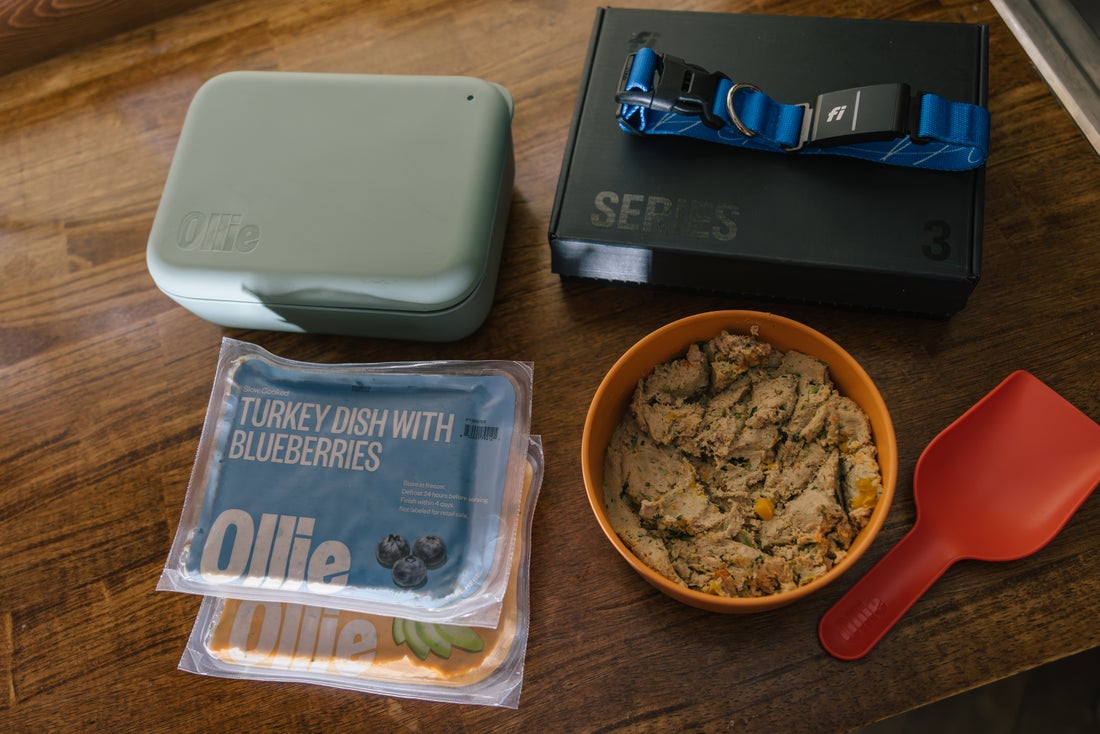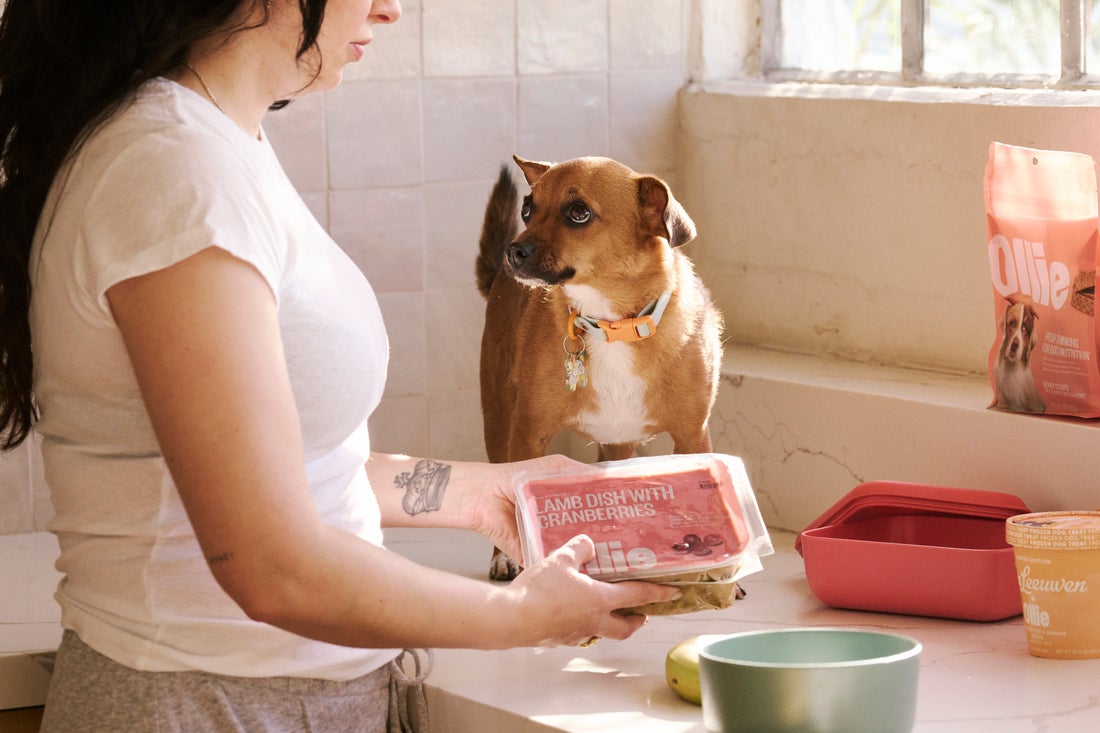Hey Ollie blog readers! We’re offering you an exclusive 60% OFF your starter box! Try now!
Post Traumatic Stress Disorder (PTSD) is a psychological condition that can impact people who have survived war, trauma, assault, abuse, or any stressful event. But did you know dogs can also suffer from PTSD? If your dog was rescued from abuse, has survived a natural disaster, war, or another traumatic event, there is a chance you may see some symptoms of PTSD.
What are the causes of PTSD in dogs?
If your dog has ever been in any of the following situations, you will want to be on the lookout for signs and symptoms of PTSD. The cause of their stress may not be limited to those listed below, but surviving any of these does increase the chance that a dog may develop PTSD.
- Military, police or search and rescue work
- Severe abuse including being beaten, shot or, hit with a blunt object
- Participating in dogfighting (fighting or bait dogs)
- Being attacked or bitten by another dog
- Receiving inadequate care like in a puppy mill
- Trauma from an accident like being in a car crash
- Surgery or intensive medical care like being on a ventilator or in the ICU
Dr. Lori Teller, an associate professor in the Texas A&M College of Veterinary Medicine & Biomedical Sciences, says, “Roughly 5 to 17% of dogs are affected with canine PTSD, but because the condition has only been recognized in dogs within the past 10 years, there is still much to learn.”
What are the symptoms of PTSD in dogs?
You may not even know exactly what might trigger your dog, you will want to keep an eye out for the signs and symptoms of PTSD. These include:
- Severe separation anxiety
- Fear of being left alone
- Sleep disturbances
- Aggression
- Avoidance of certain people or places (like the basement, the vet, or a certain street corner)
- Reactivity to certain objects
- Decreased interest in favorite activities
- Decrease in appetite or refusal to take treats
How is PTSD in dogs treated?
The treatment for PTSD in dogs is not unlike the treatment used by humans. It consists of three steps:
1. Medication
Your vet may prescribe a medication like clomipramine, fluoxetine, and amitriptyline which are also often used to treat separation anxiety. While this may be helpful, it will not “cure” your dog’s PTSD and is only one piece of the treatment process.
2. Behavioral programming
Your vet may recommend that your dog be exposed to low levels of the stressor to help retrain their brains and desensitize them to their triggers. Doing this in a controlled environment means that you can better manage how your dog is experiencing the stressor and back off if it becomes too much too quickly. If your vet is not experienced in treating PTSD you can find a veterinary behaviorist through the American College of Veterinary Behaviorists. Their directory is searchable by geography so you can find someone close to you.
3. Exercise, play, and positive reinforcement training
One of the things many experts agree on is that it is important that a dog with PTSD gets enough exercise and can have some fun! This can help the dog rebuild confidence, feel safe and help develop a stronger relationship with their owner or handlers. Studies have also shown that dogs who are able to have fun are more successful in their PTSD treatment.
Good nutrition can also play a role in managing your dog’s PTSD
Another thing that can help a dog who is managing PTSD is a healthy and well-balanced diet including good sources of Omega 3 fatty acids. Fresh food like Ollie that is gently cooked to provide the most nutritious meals can be helpful when managing your dog’s symptoms.
When creating a treatment plan for your pup, talk to your vet about their diet and any supplements they might be taking. They may recommend adding some herbal supplements to your dog’s protocol but you should not provide supplements without checking in with your vet first. This is because some supplements can interfere with each other or with prescription medications.
While this sounds pretty straightforward, it can be a slow and challenging process. If your dog has PTSD supporting them through it can take a lot of time and patience. If you adopt a dog from a shelter you may not know immediately that your dog even has PTSD – this is because some dogs will hide their symptoms when they are in “survival mode”. This is another reason dogs need a lot of time to decompress and acclimate when they transition from a shelter into their forever home.
Remember, your dog may never be “cured” of their PTSD but with good management of their environment and following the protocol designed with your vet and/or a behaviorist a dog with PTSD can still live a long and very happy life.
The Ollie blog is devoted to helping pet parents lead healthier lives with their pups. If you want to learn more about our fresh, human-grade food, check out MyOllie.com.
Tagged As:

The nutrition your dog needs,
the food they want.

Enjoying our articles? Subscribe our Newsletters and get new articles directly to your inbox
You might also like
18 September 2025
5 MINS READ
Can I Rotate Fresh Dog Food Flavors?
Yes, it’s safe to rotate fresh dog food flavors, and many dogs actually benefit from the variety. At Ollie, we offer multiple fresh recipes, like Beef, Chicken, Turkey, Lamb, and Pork so you can…
by Ollie Pets
18 September 2025
5 MINS READ
Is Fresh Dog Food Safe During Power Outages?
Fresh dog food is only safe during a power outage if it has stayed cold, specifically, below 40°F. Once the temperature rises above that point, bacteria can start to grow, and the food may no lon…
by Ollie Pets
18 September 2025
5 MINS READ
How Do I Store Fresh Dog Food While Traveling?
If you’re bringing fresh dog food on the road, keeping it cold is key. The best way to store it is in a cooler with ice packs or a travel freezer. At Ollie, our vacuum-sealed fresh food stays good…
by Ollie Pets







